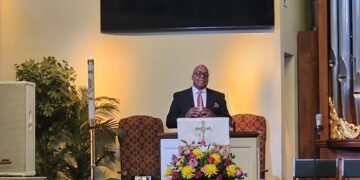Local business and economic leaders will present a proposal regarding the Farmer and Frenchman to the Henderson County Fiscal Court at its Tuesday meeting.
Missy Vanderpool, the executive director of Henderson Economic Development, said she will ask the fiscal court to consider adding new language in the county’s zoning ordinance that would establish the definition of a “farmstay.” Vanderpool said farmstay is defined in state statute.
Getting this change in the ordinance, she said, would help “this business and others in the future.”
All farmstays are bed and breakfasts, and according to KRS, two different types of bed and breakfasts are defined. A bed and breakfast home has five or fewer rooms or suites for occupancy, while a bed and breakfast inn has six of more rooms or suites for occupancy, according to KRS 219.011.
F&F currently has appealed to the county Board of Zoning Adjustments because its plan to build a six-unit bed and breakfast on its campus was denied by the county codes department. Randy Tasa, the county codes administrator, denied a permit to F&F because he said the business needed to go through the planning and zoning process.
The county BOZA heard arguments at a Nov. 10 meeting and is scheduled to vote at a Dec. 1 special called meeting. During the Nov. 10 meeting, County Attorney Steve Gold agreed with Tasa but said there are paths that F&F’s request could be attained, one being if the county’s zoning ordinance was amended.
Vanderpool said adding “farmstay” in the local ordinance could open development for other agritourism businesses in the county in the future.
“This is not just about Farmer and Frenchman,” Vanderpool said. “It’s about development in general.”
According to Kentucky Revised Statutes 219.011 to KRS 219.081, “farmstay” means a bed and breakfast establishment at a farm location whose focus includes agritourism.
Vanderpool said she was unaware of other agricultural businesses looking to develop bed and breakfasts in the county currently. Meanwhile, F&F owner Katy Mussat said there might be others that are interested in the idea.
If that could happen in the future, Mussat said, Henderson County could become more of a destination with people staying at different B&Bs and moving from one to another on a “wine trail.”
Though Tuesday’s fiscal court agenda notes that Hubert and Katy Mussat will speak regarding F&F, Katy Mussat said she will only be in attendance, and Vanderpool, Henderson Tourist Commission Executive Director Abby Dixon and Henderson Chamber of Commerce Executive Director Clay Gillham will do the speaking.
Mussat told the Hendersonian that they “want to make it easier to do agritourism.”
“We think something needs to change,” she said.
F&F in August filed for a building permit for a six-unit bed and breakfast, but Tasa denied the request, citing in an October letter that approving it—without going through the normal planning and zoning process—could allow businesses with focuses such as solar panels, wind turbines, battery energy storage systems, adult-themed entertainment and manufacturing to set up shop on land where agriculture already occurs without any oversight from local officials.
One of the arguments that Gold made at the Nov. 10 BOZA meeting was that if BOZA were to overturn Tasa’s judgment thus allowing F&F to build without going through the planning and zoning process, it “would turn every bit of planning and zoning on its head.”
F&F attorney Steve Arnett, Mussat and Vanderpool argued that the small farm winery is “ag exempt” from the planning and zoning process. Arnett, among other statutes, pointed to KRS 100.203 which states that land used for agricultural purposes “shall have no regulations” except those for setback, mobile homes and buildings located in a flood plain.
They also said that F&F is ag exempt because a previous small farm winery in the county, Ruby Moon, was granted ag exempt status for the building that housed the rooms the business rented.
Tasa told the Hendersonian that the “ag exempt” status for Ruby Moon was incorrect and should have never been granted. He said that former County Judge-Executive Hugh McCormick granted that to the Ruby Moon, and Tasa, who was early in his role then with the county codes department, was told by McCormick not to have any contact with Ruby Moon.
Tasa said his opinion on the Ruby Moon matter was somewhat validated later when state building inspectors looked into the building and told him codes needed to be enforced on it.
The county BOZA did not vote on F&F’s appeal on Nov. 10 and instead tabled the vote to Dec. 1. BOZA chair Dickie Johnson said the testimony from Nov. 10’s meeting will be transcribed and given to the BOZA members to study before the Dec. 1 vote.
The decision placed before BOZA will be whether to uphold Tasa’s judgment, which at this point would require F&F to go through the planning and zoning process, or to overturn the codes administrator’s decision, which according to Tasa, would allow them to start the building process without going through the planning and zoning process.
Mussat said she expects to continue the process with BOZA no matter what occurs in Tuesday’s fiscal court meeting.
County Judge-Executive Brad Schneider said that during the Nov. 10 BOZA meeting one of the solutions that Gold offered would be for the fiscal court to adopt a text amendment to the county’s zoning ordinance.
Schneider, who is friends with the Mussats, said “a little bit of both” when asked who contacted who about a proposal. Schneider said the conversations revolved around the process that F&F would need to go through. He said he doesn’t know any details about what Tuesday’s presentation will entail.
He said F&F is welcome to come to fiscal court and make a proposal, as any business seeking to expand would be. Schneider added that “they’re going through the same process as anyone else would.”
Mussat said that F&F has been going through the process for a year without a clear answer on how the business can proceed and has to “fight extra hard” to move her business forward because of all the detractors against F&F.
“I would not say I get any special treatment,” she said.
That steps that could come from the fiscal court meeting is that after hearing the presentation, the court could then decide to send a request to the Henderson City-County Planning Commission to hold a public hearing, followed by the planning commission making a recommendation to send back to the fiscal court to act on.
The fiscal court could also decide that it doesn’t want to send a request to the planning commission.
Based on past actions, a resolution for a fiscal court request to the planning commission would need to be written and voted upon before being sent to the planning commission. A similar procedure occurred when the fiscal court asked the planning commission to make a recommendation on a one-year wind energy conversion systems moratorium it passed in the summer.
If the fiscal court decides to send a request to the planning commission, the procedure of amending the zoning ordinance described above would take months and a change—if approved—wouldn’t be in place until at least the spring.
Mussat said she will continue on both fronts—the BOZA decision and any possible fiscal court action to amend the ordinance. She said it’s necessary for the regulations to be clarified.
It’s also an “opportunity to show that (Henderson County) can be business friendly,” Mussat said.
























